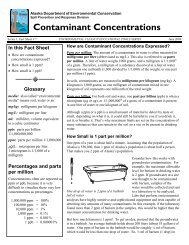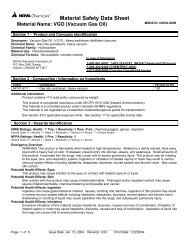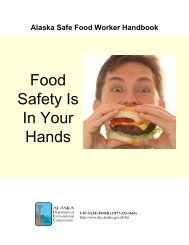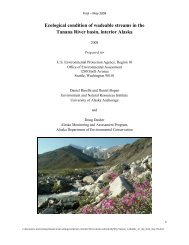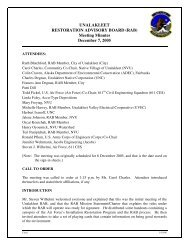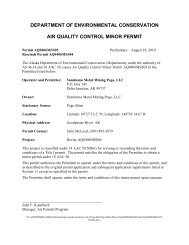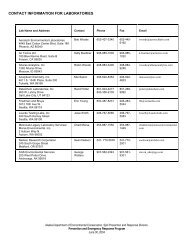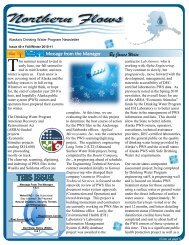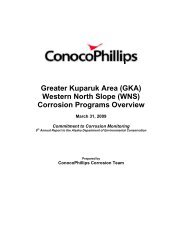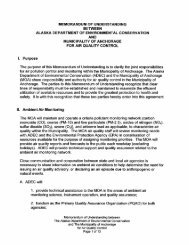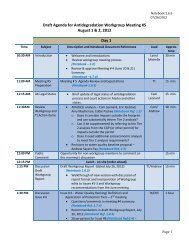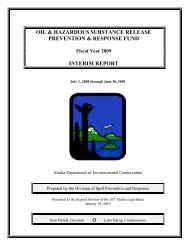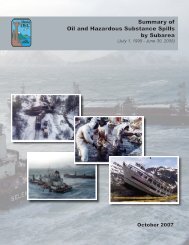2012 Ocean Ranger Guidebook Revision 3-7-12 - Alaska ...
2012 Ocean Ranger Guidebook Revision 3-7-12 - Alaska ...
2012 Ocean Ranger Guidebook Revision 3-7-12 - Alaska ...
You also want an ePaper? Increase the reach of your titles
YUMPU automatically turns print PDFs into web optimized ePapers that Google loves.
<strong>20<strong>12</strong></strong> <strong>Ocean</strong> <strong>Ranger</strong> <strong>Guidebook</strong> 3-7-<strong>12</strong><br />
MARPOL: Name given to the standards and requirements adopted by the<br />
International Convention for the Prevention of Pollution from Ships governing the<br />
discharge of oil and other hazardous substances, sewage, and garbage.<br />
MARPOL: The International Convention for the Prevention of Pollution from<br />
Ships, 1973 as modified by the Protocol of 1978.<br />
Mg/L: Milligrams per liter. The concentration at which one thousandth of a gram<br />
(10-3 g) is found in a volume of one liter; it is approximately equal to the unit<br />
“parts per million (ppm),” formerly of common use.<br />
µg/L: Micrograms per liter: The concentration at which one millionth of a gram<br />
(10-6 g) is found in a volume of one liter; it is approximately equal to the unit<br />
“parts per billion (ppb),” formerly of common use.<br />
MSC: Maritime Safety Committee. One of five technical committees of the IMO<br />
which deals with issues such as aids to navigation, vessel equipment and<br />
construction, manning requirements, handling dangerous cargoes, hydrostatic<br />
and marine casualty information.<br />
MSD: Marine Sanitation Device.<br />
Non-hazardous waste: includes shipboard garbage including plastics and<br />
synthetic material, medical waste, food wastes and recyclables such as glass,<br />
cardboard, aluminum and metal cans. Items to be checked should include:<br />
disposal and incineration records; waste sorted to prevent hazardous waste from<br />
entering the non-hazardous waste stream; no plastics or synthetics discharge<br />
overboard; separate and proper disposal of hazardous and non-hazardous<br />
incinerator ash; and proper disposal of cooking grease from grease traps.<br />
Offloading: means the removal of a hazardous substance, hazardous waste, or<br />
nonhazardous solid waste from a commercial passenger vessel onto or into a<br />
controlled storage, processing, or disposal facility or treatment works<br />
Oil (from 33 CFR 151): Oil means petroleum whether in solid, semi-solid,<br />
emulsified, or liquid form, including but not limited to, crude oil, fuel oil, sludge, oil<br />
refuse, oil residue, and refined products, and, without limiting the generality of the<br />
foregoing, includes the substances listed in Appendix I of Annex I of MARPOL<br />
73/78. “Oil” does not include animal and vegetable based oil or noxious liquid<br />
substances (NLS) designated under Annex II of MARPOL 73/78.<br />
Oil Content Meter: An instrument used to measure continuously the oil content<br />
of the effluent in the OWS output line, in parts per million, to ensure that the<br />
operation does not contravene the convention.<br />
254



